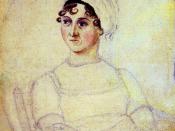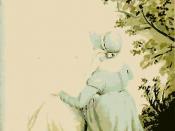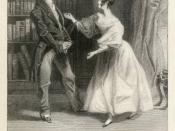'It is the small, seemingly trivial social detail that expresses a writer's attitude to the society he or she portrays'.
In the light of this statement, explore the writer's attitudes to the society they portray in Pride and Prejudice and Emma.
Jane Austen uses her novels to express her attitudes to her society and express her social concerns. These are fused into the novel by Jane Austen and are made evident through the characters (their description, speech and behaviour) and through the novel's plot.
Women's education, or rather the lack of education for women, is a major theme in Pride & Prejudice and Emma. It is easy to be fooled into believing that Harriet is stupid - however the use of that word would do a huge injustice to Jane Austen because it would neglect the concerns she is trying to convey - so let's try 'ignorant'.
A more educated Harriet would not feel such inferiority to Emma; would not look up to a girl whose faults, at first, far outweigh her virtues, just because she is of a higher class.
Emma would not have been allowed to treat and manipulate Harriet in the way that she did, Harriet would not have gone along with whatever Emma told her, and the whole farce that makes up the majority of the novel would have been spared. The Goddard school is apparently not going a good job.
The younger Bennet sisters are no better. Kitty and Lydia's deficiency of a meaningful education means that their head is left empty, their mind left with nothing to work on, and so flippantly turns to the first thing in sight, and the easiest to think on: be it soldiers, dances or hats.
This fault carries many dangers. Kitty and Lydia's determined quest to flirt with...


